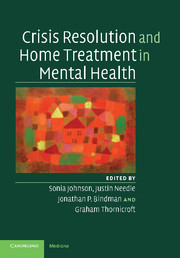Book contents
- Frontmatter
- Contents
- List of contributors
- Foreword
- Acknowledgements
- Section 1 Introduction and concepts
- Section 2 The evidence
- Section 3 Current practice
- Section 4 Variations and enhancements
- 19 Integration of the crisis resolution function within community mental health teams
- 20 Home treatment and ‘hospitality’ within a comprehensive community mental health centre
- 21 Crisis resolution teams and older people
- 22 Integrating day treatment and crisis resolution teams
- 23 Integrating crisis residential care and crisis resolution teams
- Section 5 Developing a local service
- Index
- References
20 - Home treatment and ‘hospitality’ within a comprehensive community mental health centre
from Section 4 - Variations and enhancements
Published online by Cambridge University Press: 13 August 2009
- Frontmatter
- Contents
- List of contributors
- Foreword
- Acknowledgements
- Section 1 Introduction and concepts
- Section 2 The evidence
- Section 3 Current practice
- Section 4 Variations and enhancements
- 19 Integration of the crisis resolution function within community mental health teams
- 20 Home treatment and ‘hospitality’ within a comprehensive community mental health centre
- 21 Crisis resolution teams and older people
- 22 Integrating day treatment and crisis resolution teams
- 23 Integrating crisis residential care and crisis resolution teams
- Section 5 Developing a local service
- Index
- References
Summary
In Trieste, Italy, intensive community management of crises is one element of the comprehensive service delivered by 24-hour community mental health centres (CMHCs). This chapter describes the local strategy for crisis intervention, which integrates crisis management into the work of these CMHCs, allowing maintenance of continuity of care and flexible access to a wide range of community interventions. Comparisons will be made between crisis care integrated in this way into a comprehensive community service and specialist teams, dedicated solely to the management of crises.
Trieste's mental health system: history and service structures
Trieste's service network was established in the 1970s (Bennett, 1985; Dell'Acqua and Cogliati Dezza, 1985) in order to replace the old psychiatric hospital with a radically different network of services. The hospital, which had 1200 beds in 1971, finally closed in 1980. Franco Basaglia, radical theorist and pioneer of deinstitutionalisation and community alternatives to institutions, worked in Trieste and initiated this system between 1971 and 1980 (Basaglia, 1987) and CMHCs are the central component. Today, the Trieste Mental Health Department serves a catchment area with 242 000 inhabitants. As well as four CMHCs, it has eight hospital beds, a rehabilitation and residential support service that provides 72 beds in small group homes, and a day centre where training programmes and workshops are available. It collaborates with 13 social firms run on a cooperative basis. Family and service user groups, clubs and recovery homes are also available.
- Type
- Chapter
- Information
- Crisis Resolution and Home Treatment in Mental Health , pp. 251 - 266Publisher: Cambridge University PressPrint publication year: 2008
References
- 7
- Cited by



